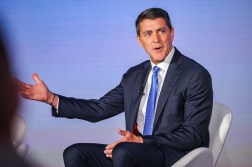Could it be that cloud computing is far more secure than the traditional computer systems used throughout government, including the Department of Defense? General Keith Alexander thinks so.
Alexander, Director of the National Security Agency and Commander of the U.S. Cyber Command, said this morning he believes the cloud is easier to protect than traditional systems, so much so that he has started pushing cloud technologies throughout NSA and wants to use the cost savings to re-invest in developing more dynamic cybersecurity solutions – both on the offensive and defensive ends.
He believes so much in this model that he plans to spread it throughout DoD in the future. In five years, Alexander said the cloud model could cut the DoD information technology spending by 30 percent.
“It could be a huge step for us and where we’re going,” Alexander said at the DARPA Cyber Colloquium at the Arlington Renaissance Capital View Hotel, November 7.
The cloud model is already providing savings throughout NSA: $100 million in savings on software licenses, a 50% reduction in systems administration costs, 60% collapse on data storage, 30% on the operating cost of data storage, an 80% cut in network enclaves and a reduction from 5,000 applications to 250. Also, a cut in the number of help desks from 900 to two and a 25% cut in data centers.
When it comes to cybersecurity, Alexander said the biggest challenge is situational awareness. It’s so bad right now, he said that situational awareness across the Internet is basically impossible.
What he’d like to see is a change in DoD’s paradigm when it comes to fighting threats. Instead of sitting back and waiting for threats to come to them, he’d like to create hunting teams that go in search of the threats and hunt out the malware in a network before it causes a problem.
Alexander said that ties into the DoD’s industry partnership where the government shares information on advanced threats with private sector partners. He said that has helped deter more threats than commercial anti-virus software products.
“We need to set up a more defined perimeter of our networks,” Alexander said.
He’d also like to see an increase in global partnerships, namely the cables that connect the United States with its European partners to more solidify the nation’s cyber borders.






